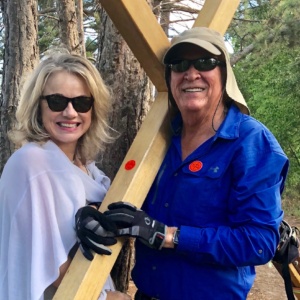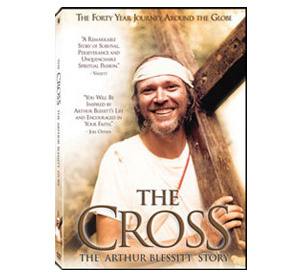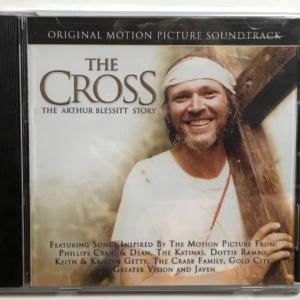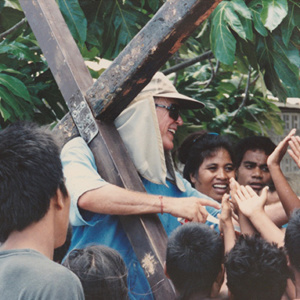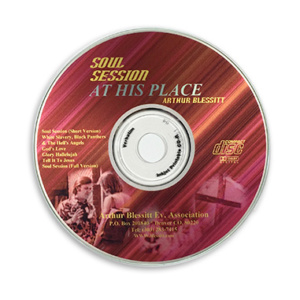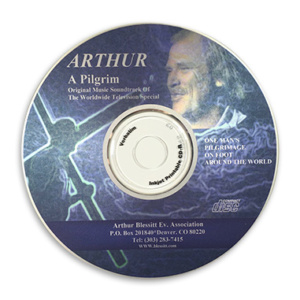TRIO
The Second Coming
Now a peppery eighty-two, Eunice Slaughter had traveled with her husband from Missouri to a Montana homestead via wagon train. Construction of a government dam had forced them out, and they had moved to Elko.
Mrs. Slaughter was one of the first to join our church, and though she had never before in her long life witnessed for the Lord, she became imbued with the spirit and staked out as her special targets the girls who lived and worked at the Lucky Strike house, located next door to her home.
One afternoon Mrs. Slaughter was sitting in the parlor of the Lucky Strike, surrounded by the madam and all her girls.
“I’m telling everyone of you to get right with the Lord. If you don’t repent, you’re all going to hell as soon as Jesus comes again.”
“How will we know when Jesus comes again?” one of the girls asked.
Mrs. Slaughter’s wrinkled face was stern. “When Jesus returns,” she said with a certitude that left no room for doubt, “the heavens are going to open up, the trumpets will sound, and you’ll hear that good old gospel music!”
I didn’t know about Mrs. Slaughter’s witnessing session when I went down to witness myself the evening of the same day to the old, discarded ladies who lived in a cluster of squalid cabins directly behind the Lucky Strike.
As I approached, I heard a burst of raucous noise slash through the cold winter night from one of the cabins. The scene when I entered through the open door was straight out of the inferno. The small room was filled with perhaps twenty elderly men and women, all roaring drunk. One woman and two men were lying on the bed passed out.
A big fellow walked up to me. “I know you, you’re the preacher.”
“That’s right.”
“If you’re a preacher, let me hear you preach.” He called for quiet and in a moment all was stillness. “Now you preach.”
I opened my Bible and read from John 3:16, “For God so loved the world, that he gave his only begotten Son, that whosoever believeth in him should not perish, but have everlasting life.'”
Then I went on for about ten minutes, emphasizing the importance of embracing Christ.
“I want to be saved,” one of the wizened women pleaded.
I got on my knees and prayed, leading her to the Lord.
“That was a fine sermon and prayer,” the big fellow said. “Now let’s sing.”
We formed a circle and joined hands. Soon the loud sound of “The Old Rugged Cross” filled the cabin and wafted out through the open door.
On a hill far away stood an old rugged cross,
The emblem of suffering and shame;
And I love that old cross…
Above the music I suddenly heard piercing screams. I ran outside in time to see the powerful backyard floodlights of the Lucky Strike send shards of glare through the darkness. Less than twenty feet away, fifteen windows zipped up. The singing was still going on in the cabin, louder than ever …
So I’ll cherish the old rugged cross …
At each open window was a lady. They were baying at the top of their lungs. I was thoroughly perplexed as I heard them shout:
“Jesus is here!”
“Just like Mrs. Slaughter said.”
“Forgive me, Lord!”
The singing and shouting went on for a full fifteen minutes as I stood between the cabin and the Lucky Strike dumbstruck at the thought that everybody in sight had somehow come dramatically under conviction.
The next day as she was telling me about her witnessing session with the ladies, Mrs. Slaughter, who was partially deaf, said, “Preacher, I could swear I heard gospel singing last evening.”
“You did,” and I gave her the details of the impromptu revival in the cabin and the screams from the girls.
She looked at me out of wise old eyes. “Then that explains it,” Mrs. Slaughter said.
“Explains what?”
“I stopped at the Lucky Strike on my way over here. That madam is as upset as a rooster without hens.”
“Why?”
Mrs. Slaughter said, “She told me that for some reason last night her three best girls packed and hightailed it out of town.”
“Killer Christian”
Louisiana-born Louis McDonald had brown hair, quick dark eyes, a firm handshake, an overwhelming personality, and perhaps the most amazing story of a restructured Christian life that I’ve ever heard.
I met him at Elko General Hospital. After, I’d go from floor to floor and door to door, looking in on patients.
Mac was in traction when I stepped into his room and introduced myself.
Truculent and bitter, he gave it to me straight from the gut.
“I don’t want a thing to do with you. I’ve had it with every Baptist preacher in the world. You’re all nothing but a gang of frauds and opportunists. I’m not interested in anything you have to say. Go somewhere else. I’ve got trouble enough. I’m paralyzed from the waist down and the doctor says I’ll never walk again.”
“Let me leave a tract with you.”
“Keep it. I know it by heart. I know it backwards and forwards. I was a Baptist preacher myself!”
Here was a man desperate for help. Once a messenger of the Lord, he was living now outside God’s will. I wasn’t about to be discouraged, no matter how resoundingly he rejected me.
I visited him again the next day. He was still in high dudgeon. When I tried to talk about God he cut me off with a curse. After a week he softened and, maybe because he was bored lying helplessly in bed, he told me his incredible background.
At sixteen, using a shotgun, he had killed a man who was pistol-whipping his father. Sent to reform school, he escaped a number of times, but was always caught. At nineteen he enlisted in the Marine Corps and fought in Korea.
After his discharge, he killed another man in a barroom brawl in Texas. He claimed self defense at his trial, but was convicted and sent to prison. He escaped soon afterward, taking with him two guards as hostages.
He then made the FBI’s Ten Most Wanted list.
Cornered in a Sacramento, California, hotel, he was slapped into the local jail, and escaped again. He was caught once more. Then followed four more escapes from various prisons. He was hunted down after each breakout and taken back into custody.
After his fifth escape he was caught by the FBI. He went into deeplock at Kansas’ Leavenworth prison. His sentence was ten to life.
By now Mac had tired of running and fighting the world. He determined to change. Through prison correspondence courses he earned his high school diploma and credits from the University of Kansas.
Then he was converted and brought to the Lord by a Mennonite minister. Completely rehabilitated, a model prisoner, he was paroled in seven years. Mac was licensed to preach and became an associate pastor at a Baptist church in Kansas.
he tale of the convict-turned-preacher attracted the attention of scores of churches in the Midwest. Requests by the dozens came in for him to give his testimony. Believing he was serving God, Mac accepted every invitation.
Whenever he was scheduled to speak in a city the local pastor, to drum up a crowd, sent a press release with the sensational details of Mac’s life to the newspapers. He was heralded in print as the “Killer Christian.” He was promoted as a former convict and murderer who had made the Who’s Who of the FBI’s most wanted list.
The crowds poured in, breathless to hear him, and Mac soon became something of a celebrity. But he realized he had become something else, too: a monkey on a string, a French poodle Christian, exhibited, combed dry, and then sent on his way. He was a showpiece being used to frighten children and sinners.
He began asking the pastors at the churches where he appeared to help him enroll in a Bible college. He wanted to grow as a Christian. But nobody was interested in helping him.
“I never had time to pray. I didn’t have time to study. I didn’t have time to get strong. I was just running from one place to another testifying.”
He wasn’t proud of his criminal past. He wished with all his heart he hadn’t killed two men. Now he wanted only to preach, omitting most of his gory experiences. However, no one wanted to hear him talk about Jesus. The pastors told him to give his testimony and let them do the preaching.
“I got shook, not in my belief in God, but with the churches. They were exploiting me. Nobody wanted to hear me talk about the Bible. Nobody wanted me to give just a brief testimony about my life, tell how bad it had been and how happy I was since I’d been saved. Those preachers and congregations wanted every grotesque detail, every ounce of sin. The more horrible I made my testimony, the more thrilled they were. It was like a hanging or a bullfight.”
In disgust Mac finally stopped testifying and disappeared into a small town in Tennessee. He met a pretty girl, married her, and they began raising a family.
He came to Elko, worked first in a construction gang, then as a truck driver. He earned as much as $7 an hour, working ten to twelve hours a day seven days a week. He had a beautiful trailer home, a luxury car, an expensive wardrobe, and more money than he could spend.
Then one day on the highway something went wrong with his steering wheel. His truck careened off the road and rolled over.
His world caved in. All he could look forward to now was a life as a hopelessly bedridden paralytic.
Week after week, I worked with Mac, trying to rebuild his faith.
“Mac, you got a taste of superficial Christianity and you rebelled. But God isn’t through with you. He still wants to use you.”
I finally made contact.
“You’re my kind of preacher,” he smiled.
He started reading his Bible again. We began praying together. I told him that if he had faith God would heal him. Mac then recommitted his life to the Lord.
From the day we said our first healing prayer to God, Mac began to improve. He felt a tingle in his legs. When the doctor pricked him with a pin, he felt pain. The doctor was amazed that he had come that far.
Mac was on the road back, all the way back, and the trip was punctuated by continuous prayer and faith and belief.
Sensation came coursing into his legs. Then a little movement. He got into a wheel chair for the first time to attend services at our church.
The doctor discharged him from the hospital but said there was only a feeble hope that he would walk again.
A few days after leaving the hospital Mac called. When I went to see him, he took a step toward me, then fell flat on his face. Yet he had taken a step.
Soon he was managing two … three … a dozen steps. Sometimes his legs buckled under him, but he picked himself up and kept trying. “God,” he declared, “with your help I’ll walk again.”
From his wheel chair Mac went to braces. Finally, after a few months, he could walk again.
His legs were as good as new.
Mac joined our church, and I led his wife to the Lord and baptized her. Mac not only became my assistant pastor at no salary, but when I couldn’t make a preaching service, he’d go in my place. At a church in Wendover, Utah, the congregation was so impressed with his fire that he was asked to become pastor.
He turned the offer down. “I’m not ready to pastor yet,” he told me. “I need more training. I don’t know if I’ll ever pastor. I don’t know if God is calling me as a pastor.”
No one in Elko except myself knew of Mac’s past. His days of lurid testimony were over. Now he preached about Christ, the Bible, and the thrilling life of dedication to God.
He led several people to Christ, and helped a number of kids stay out of trouble.
Now Mac lives in Chicago, earning a good living repairing automobile transmissions. He is a lay minister at midweek prayer meetings and he preaches on Sundays. He’s living in serenity and peace, his days as the “Killer Christian” a memory long dead.


